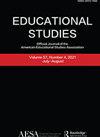How Did the COVID-19 Pandemic Exacerbate the Digital Divide at Secondary Education: The Case of Two Chinese Schools
IF 1.6
4区 教育学
Q2 EDUCATION & EDUCATIONAL RESEARCH
引用次数: 0
Abstract
AbstractIn major public health crises, online education can play an important role in guaranteeing the continuity of education. However, whether online education can promote educational equity has been questioned widely. The COVID-19 pandemic has revealed severe challenges students face in online teaching. Based on Bourdieu’s theory of cultural reproduction and 34 interviews with participants including students, parents, and teachers, this research adopted a case study approach to explore the digital divide among Chinese rural and urban secondary school students during the COVID-19 pandemic. It was found that despite measures adopted by the Chinese government, a wider digital divide has been created between urban and rural secondary schools, and the online learning result was heavily influenced by the socioeconomic status of both the individuals and the schools they attended. More specifically, compared with urban students, rural students had less access to sui digital devices and environment, quality-parental guide and supervision, effective teachers’ instruction, and worse habitus and less ability in independent online learning. Overall, this study calls on policymakers, leaders, educators, and parents to take collective actions to create a more effective online educational environment for students from the vulnerable and disadvantaged groups. Disclosure statementNo potential conflict of interest was reported by the author(s).新冠肺炎疫情如何加剧中等教育的数字鸿沟:以两所中国学校为例
摘要在重大公共卫生危机中,在线教育可以发挥保障教育连续性的重要作用。然而,网络教育能否促进教育公平却受到了广泛的质疑。新冠肺炎疫情暴露了学生在线教学面临的严峻挑战。本研究以布迪厄的文化再生产理论为基础,通过对34名学生、家长和教师的访谈,采用个案研究的方法,探讨新冠肺炎大流行期间中国城乡中学生的数字鸿沟。研究发现,尽管中国政府采取了措施,但城市和农村中学之间的数字鸿沟仍在扩大,在线学习结果受到个人和所就读学校的社会经济地位的严重影响。具体而言,与城市学生相比,农村学生使用良好的数字设备和环境的机会较少,父母的引导和监督质量较差,教师的指导效果较差,在线自主学习的习惯和能力较差。总体而言,本研究呼吁政策制定者、领导者、教育工作者和家长采取集体行动,为弱势群体的学生创造一个更有效的在线教育环境。披露声明作者未报告潜在的利益冲突。
本文章由计算机程序翻译,如有差异,请以英文原文为准。
求助全文
约1分钟内获得全文
求助全文
来源期刊

Educational Studies
EDUCATION & EDUCATIONAL RESEARCH-
CiteScore
5.50
自引率
0.00%
发文量
60
期刊介绍:
Educational Studies aims to provide a forum for original investigations and theoretical studies in education. The journal publishes fully refereed papers which cover applied and theoretical approaches to the study of education. Papers should constitute original research, and should be methodologically sound, theoretically informed, and of relevance to an international audience. The journal is particularly interested in research that aims to inform educational practice(s) within and/or across sectors. Whilst the journal is principally concerned with the social sciences, contributions from a wider field are also encouraged. Empirically-based papers are particularly welcome.
 求助内容:
求助内容: 应助结果提醒方式:
应助结果提醒方式:


